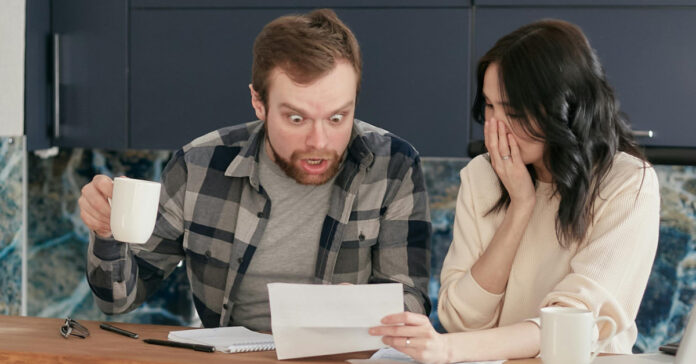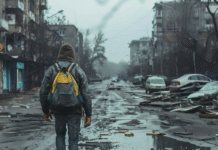NOTE: After writing the last post on assets, I decided to cover what happens to debts aftr the SHTF because Americans have an unhealthy amount of debt.
Let’s imagine you have a car with 28 months of $569 payments remaining before you own it outright. Your spouse drives a leased vehicle with payments of $427 per month. You have lived in your home for three years and have a 30-year mortgage. Your mortgage payment is $2,842 per month. Between the two of you, you have almost $16,000 in credit card debt. It’s a hassle, but it doesn’t bother you too much. After all, you have a combined income of almost $165,000 a year.
What happens to your debt after the SHTF will depend on what type of a SHTF scenario we face, as explained below. They are not all the same.
What Happens to Debt During Inflation?
When money is devalued by inflation, you pay off your debt with money that is worth less than the money you borrowed, even if you end up paying more than you borrowed because of interest. Sounds like some kind of magic, doesn’t it? But it is one reason governments that take on debt tend to like inflation.
If inflation hits 10 percent, you may be paying more for gas, groceries, clothing, and other goods, but your car payments don’t change. Your mortgage creeps up a little because of the rising cost of homeowner’s insurance, but the total payment grows well below the rate of inflation.
Two years later, prices are about 40 percent higher and your salary has increased by only 33 percent. You know your earnings are lagging behind inflation, but you no longer have a car payment, so that helps. When your spouse goes to lease a new vehicle, the monthly cost is almost $250 more than your old lease, and they wanted a ridiculous down payment. The two of you decide to buy instead. The new payment is almost $800 a month, but in the long run, it turns out to be a smart move as car prices, like everything else, shoot up the following year.
Inflation reaches 87 percent the following year and continues to soar. Your job is giving employees cost-of-living increases every month based on the rate of inflation, and your combined income is over $400,000. Still, you feel like you are falling behind as inflation keeps rising. You’d like to double up on your mortgage payment, but food and energy are so expensive you can’t afford to.
The following year, hyper inflation hits as inflation reaches the triple digits. You sell a Rolex Submariner watch you inherited from your grandfather. Thanks to inflation and people seeking tangible investments, it’s worth a small fortune. You use the money from the sale to pay off your mortgage.
Arguably, if you are going to have debt, the best time to have debt is right before inflation strikes. (I don’t recommend debt under any circumstances, but I can understand if you need a mortgage.) The worst time to take on debt is during inflation because no one will give you a flat rate and adjustable rates will kill you.
What happens to Debt During a Financial Collapse?
During an economic collapse, many people end up defaulting on debt because they lose their jobs. Think the Great Recession of 2008, but worse. Businesses and banks may also go bankrupt or default. When a bank has bad loans on the books, the bank becomes worth less. Too many bad loans can lead to a banking collapse.
If you lose your jobs and can’t pay the mortgage, it’s possible the bank might not want your house back and you can continue to live in it for some time before they foreclose. Alternatively, they may offer you a special program where you don’t have to pay anything for a few years, even though interest still accrues. Anything to keep a bad loan off their books. Government programs might also prevent you from being foreclosed.
If you stop making your car payment, they will repo it. My advice is to stop paying the credit cards and make the car payment so you don’t lose your investment in the vehicle. (Plus, they can’t repossess stuff you bought on an unsecured credit card.) You have no investment in the leased vehicle, so stop making the lease payment and offer to turn in the car. If you both lose your jobs, you can manage with one vehicle.
Depending on the length of the economic collapse and how hard it affects you, you may have to declare bankruptcy. It depends on how hard the collectors are pursuing you. Of course, if you have no income, they won’t get much from you. The best time to file for bankruptcy may be right when you sense a recovery coming on. You could get out of debt with a clean slate.
A Grid Down SHTF Event
If we experience a 10-year SHTF as described in our last post, how much money you owe will be the least of your concerns. You’ll be far more worried about putting food on the table, having a clean source of water, and keeping warm during the winter.
Without electricity or the Internet, no one is going to be calling or harassing you to pay your debts. When the server firms die off, the banks and financial institutions will go down as well. Just as you won’t be able to prove how much money is in your 401k, the bank won’t be able to prove how much you owe them. And even if you wanted to pay, how would you?
No, the big question about debt during a SHTF event is, will your debt still exist after the recovery? No doubt the banks would like it to. You can bet some company will be out there buying up debt and then chasing after those that survived, trying to collect. My hope is the government of whatever recovered country we have left will discharge all debts. Plus, the old U.S. dollar won’t exist, so how can a bank collect a debt measured in dollars if dollars no longer exist?
The banks, if any still exist, will have plenty of other problems and unanswered questions. What happens to all the property owned by people who died? Who will pay those mortgages? Will the bank own the property if there are no owners and no heirs come forward? What will happen to property values if there are only a small fraction of the population left alive? If your house or apartment burned down in an arson attack early in the collapse, will you be able to collect anything from an insurance company? Will squatters get property rights?
No one knows. While I can’t predict what will happen to your mortgage after the recovery, we can be sure there will be a host of reasons why you won’t have to pay it during the grid down event itself.
What Happens to Government Debt?
When governments build up too much debt, they may default on loan or bond payments. In the U.S., we just print (create) or borrow more money. It’s akin to using one credit card to pay off another. At some point, the card companies stop raising your limit. At some point, investors will wise up and having the Federal Reserve buy up all the bonds will no longer work.
In the meantime, borrowing costs will continue to rise, meaning interest rates will go up. Higher rates combined with a larger money supply mean inflation will continue to grow even faster than before. At some point, the 40 percent or 87 percent inflation rate mentioned earlier could happen here.
When the Ponzi scheme of borrowing new money to pay off old lenders collapses, expect the government to fail. That means no more social security, veteran benefits, food stamps, welfare payments, government salaries, defense spending, etc. This will quickly trickle down to the state local level, and we’ll see services cease. The result will be millions of furious people. That anger will lead to either martial law or scenes from the Purge, perhaps both. This will see the start of all those deaths the government expects to be caused by a grid-down event. Your best bet is to be far from any civil unrest, rioting, or out-of-control people. That’s when living well outside the city and off the ebaten track will be important.
In my opinion, an economic collapse caused by government default is worse than one started by a banking collapse. It’s worse than a recession or even a full-on depression. The only good news is you will spot signs of it coming, including rampant inflation. If the country ever starts to look like Venezuela, take some steps to protect yourself. It will not be easy, so start making those preps now.







